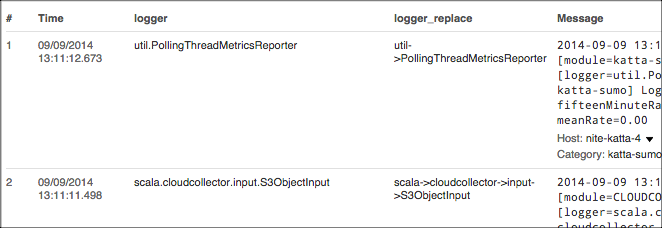replace Search Operator
The replace operator allows you to replace all instances of a specified string with another string. You can specify the string to replace with a matching regex or literal text. You might use it to find all instances of a name and change it to a new name or to replace punctuation in a field with different punctuation. This operator is useful anytime you need to rename something.
Syntax
replace(<sourceString>, <searchString>, <replaceString>) as <field>
replace(<sourceString>, /<regex>/, <replaceString>) as <field>
Rules
- An alias is required.
- If any of the inputs are null, the output is null.
- If the searchString is not found or the regex does not match, the sourceString is returned intact.
- Regex must be RE2 compliant.
- The string is case sensitive.
- When using multiple replace operators on the same field you must use the same alias, see an example below.
Regex usage
You can use a regex to define what you want to replace. Capture groups are optional. You can use named or numbered capture groups to then reference in the <replaceString>.
Named capture groups: /(?<section>flight)\/(?<id>[0-9]{5,})/
Where you'd reference the named capture group section by its name in the <replaceString> with ${section}.
Numbered capture group: /(flight)\/([0-9]{5,})/
Where you'd reference the first capture group in the <replaceString> with $1, and the second capture group with $2.
Using $0 will reference the whole matching string.
Required characters to escape
If the <replaceString> needs to include the dollar sign ($), it needs to be escaped as \\$. Similarly, backslash itself needs to be escaped as \\\\. Some other escapable characters include:
\n: replace with a new line character\t: a tab character
Examples
Replace unique IDs in URLs with a regex
If you have a URL and would like to see the number of times it was visited, but do not want to aggregate with unique IDs, you can replace the IDs with an empty string. Take the following URL, where in this example it belongs to a field named url:
http://somewebsite.com/flight/12345678/certification
To remove the ID 12345678 from the field url you can use the following query with a regex:
| replace(url, /[0-9]{5,}/, "") as url
This provides the URL like:
http://somewebsite.com/flight//certification
This would allow you to count the number of times the URL was requested without the specific IDs.
Replace with regex capture group
Following on from the previous example, you can reference strings in a capture group from your regex to use in the replace string. Take the same URL:
http://somewebsite.com/flight/12345678/certification
To replace the ID section of the URL with different text that includes a string from a capture group you can use the following query:
| replace(url, /(flight)\/([0-9]{5,})/, "new-$2-url") as url
This provides the URL like:
http://somewebsite.com/new-12345678-url/certification
The regex has two capture groups and in the <replaceString> we have specified $2 to have the second capture group's value included in the <replaceString>.
Replace periods in a field with different punctuation
To replace periods in a field with different punctuation, you'd use the following query. This query also uses the Fields operator to display only the required fields.
error
| parse "[logger=*]" as logger
| replace(logger, ".","->") as logger_replace
| fields logger, logger_replace
which provides results like:

Remove underscores from a field to make it human readable
If you had underscores in a field called moduleName, you'd use a query such as:
... | replace(moduleName, "_", " ") as humanReadableModuleName
Replace periods in a phone number with dashes
To replace periods in a phone number with dashes, you'd use a query such as:
phone_num
| parse "[phone_num=*]" as phone_num
| replace(phone_num, ".", "-") as phone_num_dash
Rename a deployment’s abbreviation with a full name
In this example, we have a field called deploymentName with values that are abbreviations for the different deployments in an environment, such as apac-prod, eu-prod, us-prod, and us-dev. To replace the abbreviations with full titles for each deployment, you'd use a query like this:
replace(deploymentName,"apac","Asia Pacific") as deploymentName
| replace(deploymentName,"eu","Europe") as deploymentName
| replace(deploymentName,"us","United States") as deploymentName
| replace(deploymentName,"prod","Production") as deploymentName
| replace(deploymentName,"dev","Development") as deploymentName
Use the Replace operator on multiple strings within one field
For example, in multiple strings, to replace all number 5's with number 7's, and also replace all 4's with 2's, use multiple replace operations, as shown in the following query:
| replace(field, "5","7") as field
| replace(field, "4","2") as field
The same field name, field in the above example, needs to be passed to subsequent replace operations. You can change the field name (alias) in the last replace operation.
In this example, we set the initial event_id to match the event_code, and then do the replace operation on the event_id. This way, the event_id is always set with the match, and then the replaced value is passed back into the field with any subsequent operations that do not match.
_sourceName=Application
|timeslice 1h
| parse "SourceName = \"*\";" as Source
| parse "Type = \"*\";" as Level
| parse "EventCode = *;" as Event_Code
| event_code as event_id
|replace(event_id, "1073743528","1704") as event_id
|replace(event_id,"1073758208","16384") as event_id
|replace(event_id,"1073742726","902") as event_id
|replace(event_id,"1073742890","1066") as event_id
|replace(event_id,"1073742724","900") as event_id
|replace(event_id,"1073750833","9009") as event_id
|replace(event_id,"1073742727","903") as event_id
|replace(event_id,"1073742827","1003") as event_id
|fields - event_code
//|count by level, _timeslice
//|transpose row _timeslice column level
|count by event_id